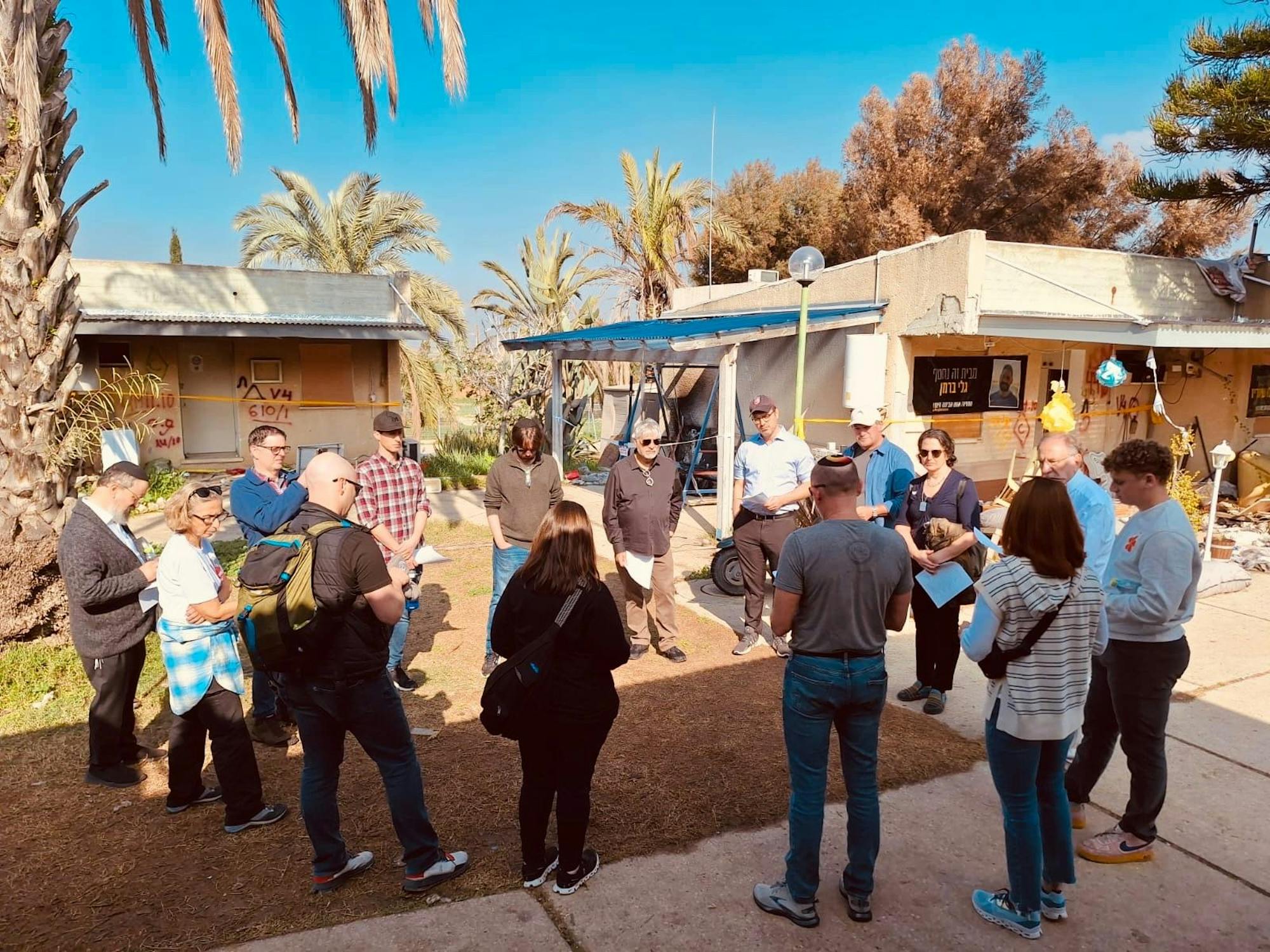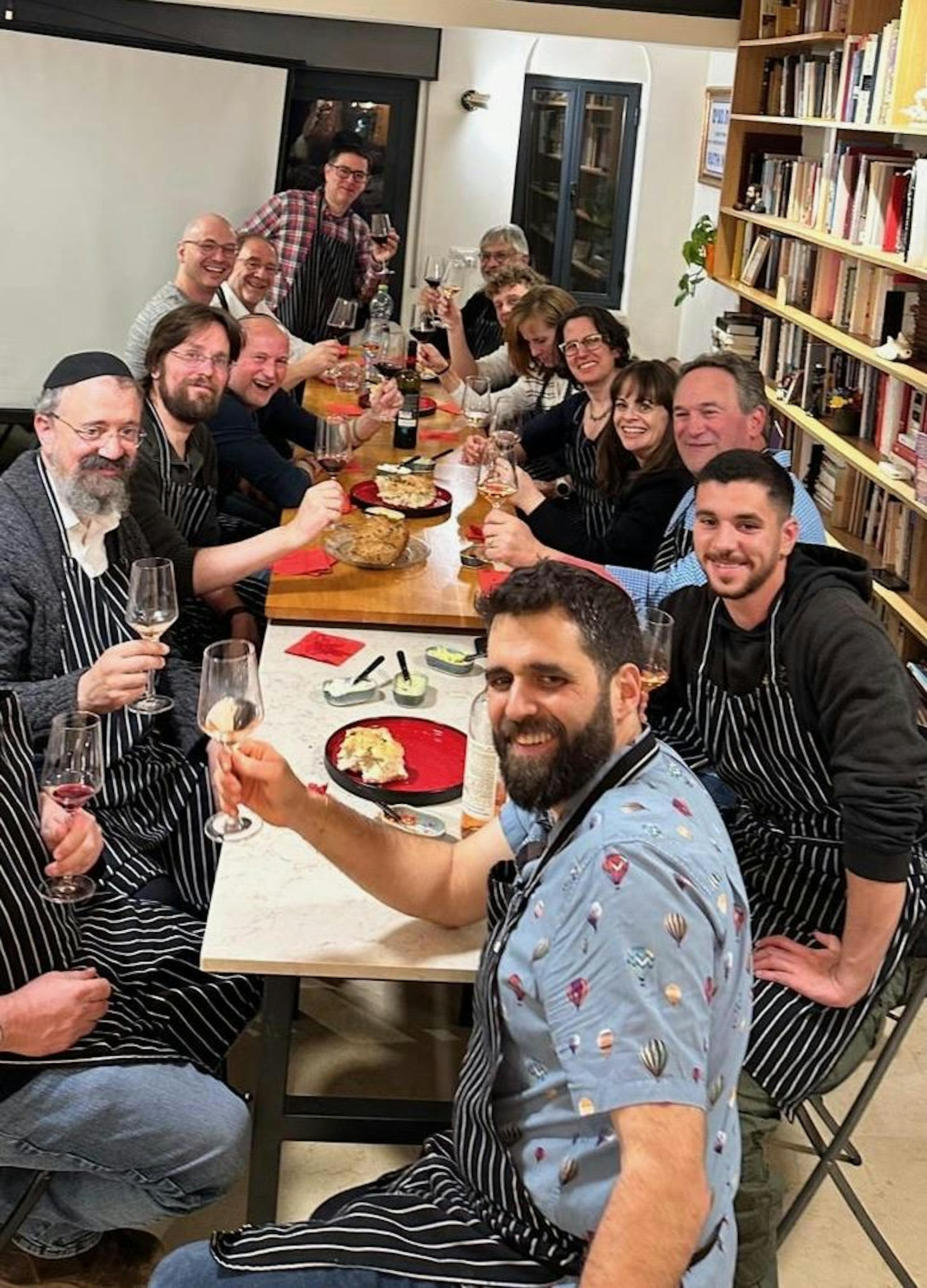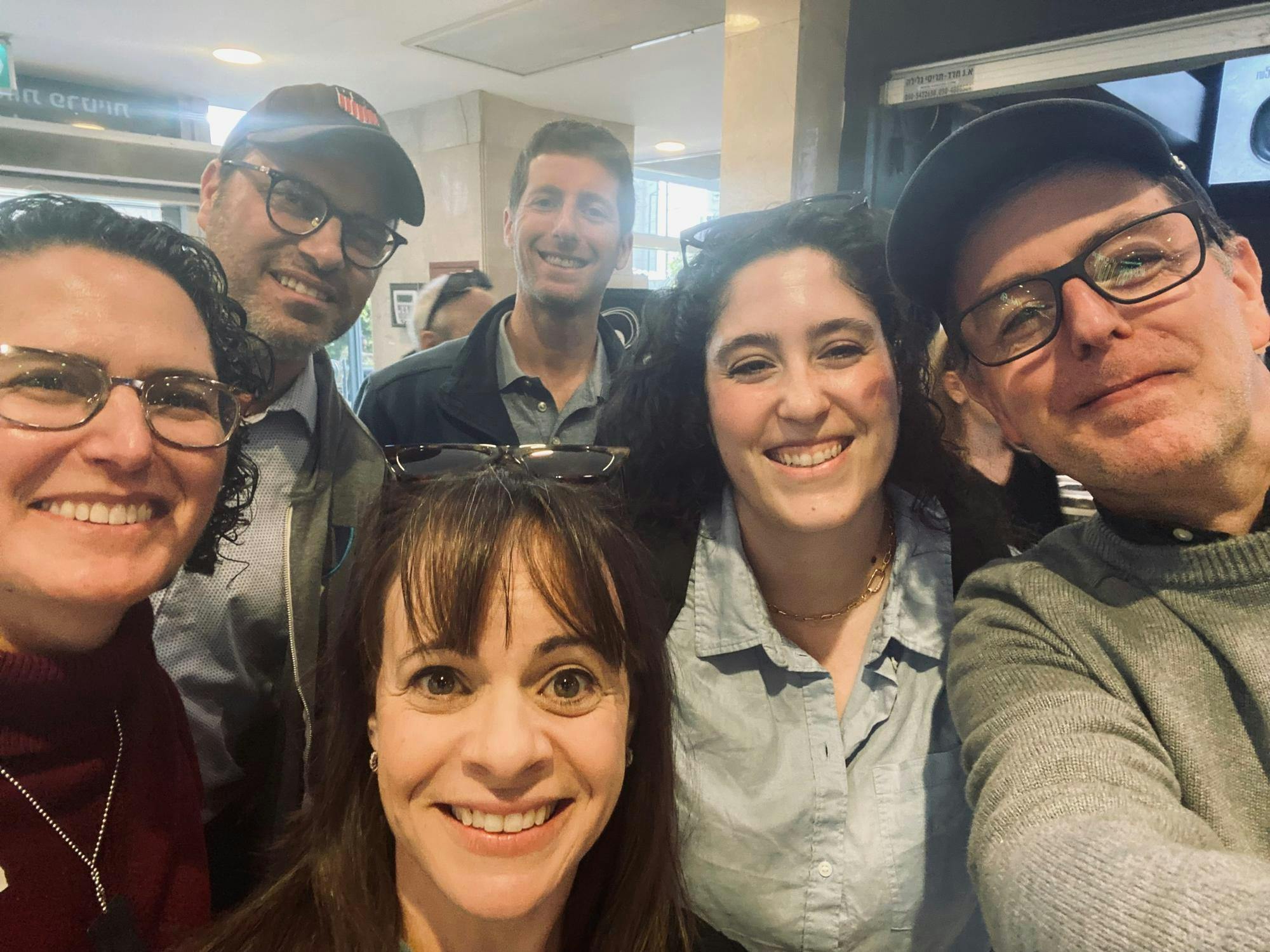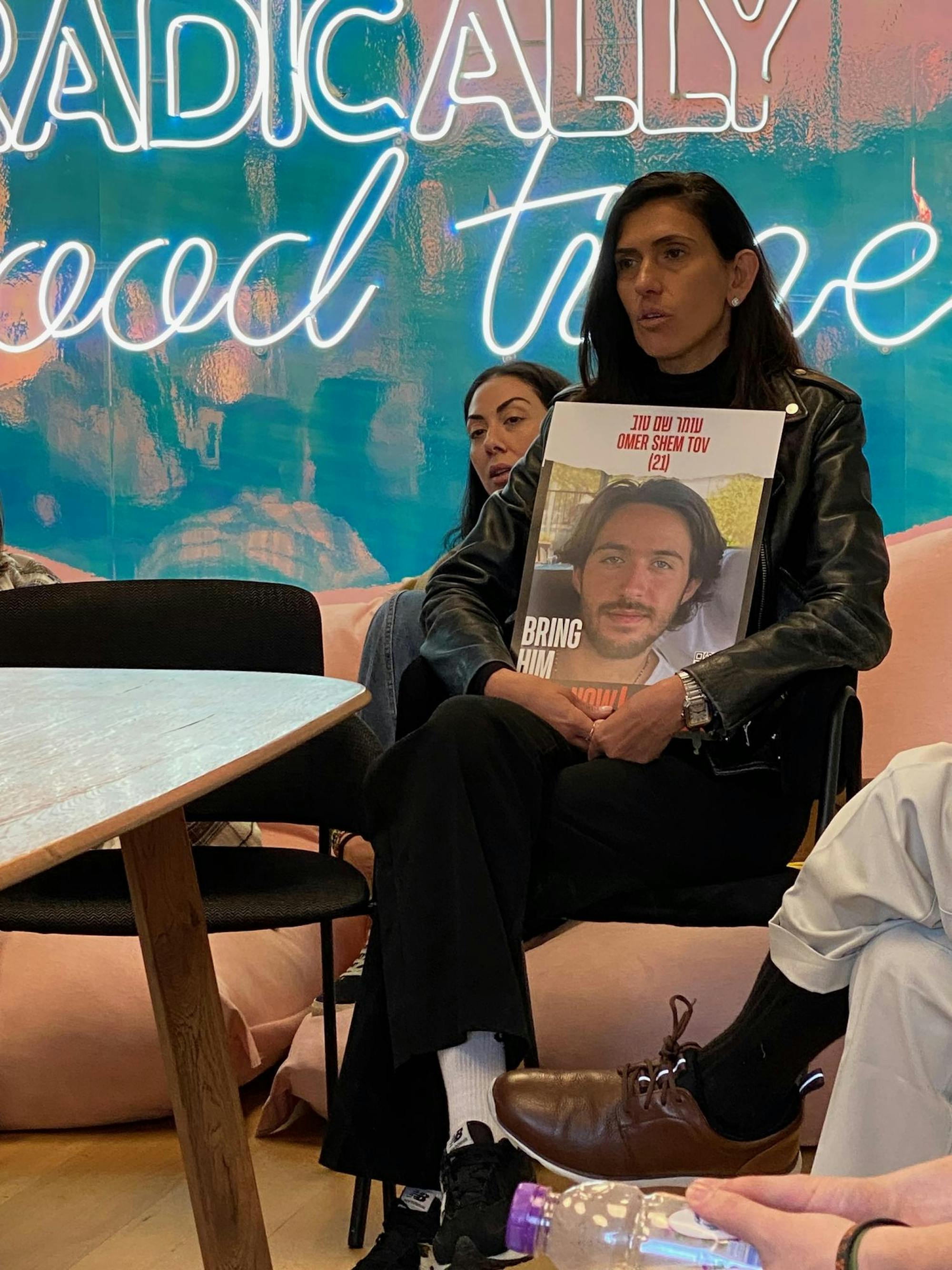It began with an extremely targeted goal: A united solidarity mission to Israel with the rabbis of our Nashville community, travelling to learn, to listen, to see, to witness and to stand with and to console the members of our extended Jewish family, and to then return to share the lessons learned from that experience with the greater Nashville Jewish community.
There are several solidarity missions visiting our Jewish homeland now, but none of them this unique. Nine Nashville rabbis, representing all five of Nashville’s congregations, spanning the religious spectrum from Reform to Chabad, representing all genders, ages, and years of experience in the rabbinate, along with a handful of other Jewish communal professionals, academics, and philanthropists. We were 14 in all, each of us deeply and profoundly affected by our brief yet extensive view into the current mood, morale and resilience of our Israeli brothers and sisters.



We toured the communities bordering the Gaza Strip, met with numerous soldiers, both in active duty and recovering from being wounded in the field. We met with evacuees from those same communities, and with parents and children of the hostages. We experienced the powerful and moving images at Hostage Square in Tel Aviv and visited the graves of the young soldiers who have fallen in combat since October 7— row after row of them—at Har Herzl, Israel’s Arlington, in Jerusalem. We volunteered packing vegetables at a moshav, helping to fill in the gap of foreign laborers and others who have fled the country since the start of the conflict.
And we had the honor of witnessing the donation of two armor plated ambulances to the Israeli first responder organization, United Hatzalah by Bernie Pargh, who also underwrote the land costs of the trip for all participants.

All in all, it was a sacred, meaningful, moving, and powerful experience. It brought all of us in the clergy closer together, something which will benefit the entire Nashville Jewish community.
The people of Israel are traumatized yet incredibly resilient, as are we. Their strength in turn strengthened us. I remain incredibly proud of each and every one of my colleagues for joining me on this journey.
What follows are reflections offered by many of them. To hear more from the rabbis, the community is invited to the Rabbi’s Report event on February 8, 7-8pm at the Gordon Jewish Community Center.
Rabbi Dan Horwitz, The Jewish Federation of Greater Nashville:
Vignettes from Israel
Sunday: I arrive to a near-empty Ben Gurion airport. I hop in a taxi to head towards my sister’s apartment in Tel Aviv. At a stoplight, my cab driver rolls down his window to chat with the driver of the car stopped next to us, who is pulling a Formula 1 racecar on an attached trailer. My cab driver asks the other driver for his cellphone number. The other driver provides his number. The cab driver calls the number, the other driver answers the call, and they have a 10-minute conversation on the phone about car racing while we drive in opposite directions. Only in Israel!
Monday: Fight jetlag. Eat hummus. Repeat.
Tuesday: We enter Kfar Aza – one of the kibbutzim near the Gaza border that was attacked. It’s one of the most beautiful places I’ve ever seen – lush greenery, stunning flowers, fruit trees in every direction… paradise. We hear recurring “booms” in the (perilously close) distance. We’re led on a tour by a lifelong kibbutznik in her 70’s who survived October 7. We see the armory, housed in the center of the kibbutz, and learn that as the massacre was taking place, a number of terrorists knew where the armory was in advance and camped out there in order to gun down those running to try and collect weapons to defend themselves. We saw blood, char marks, explosive residue, hopes, and dreams destroyed.
Wednesday: I meet with teenagers in Hadera, our partnership region. They are asking about being Jewish in America and are legitimately concerned about US and OUR safety here in the USA given the alarming prevalence of antisemitism. They’re wondering why, given what they perceive as our lack of comparative safety, we don’t move to Israel. They feel safe and trust the IDF to defend them – many express that they are eager to serve in order to contribute to the defense of the country. Also – Bernie and Maria Pargh demonstrate that we all have the ability, in ways large and small, to have a significant and immediate philanthropic impact in support of our Israeli family during this challenging time.
Thursday: We visit with wounded soldiers at Ichilov hospital in Tel Aviv. One, who had been shot twice, tells us repeatedly that he is proud to put his life on the line to protect both Israeli and Palestinian civilians. Because after all, he says, if Israel didn’t care about Palestinian civilian lives, they wouldn’t put foot soldiers on the ground and put their lives at risk – they’d simply conduct aerial assaults. He’s prepared to rejoin his unit once he is rehabilitated. Also, it’s Kfir Bibas’s birthday. He’s 1 year old. He remains one of more than 130 hostages still being kept in Gaza as of this writing (although many wonder if some of the hostages have been smuggled out, and whether the hostages are all still alive).
Friday: I run – sometimes literally – to hug loved ones. Partake of a vegan eatery for lunch with a college friend, playground playdate in the afternoon, leads into preparing and hosting Shabbat dinner for friends who are family. Tears of joy, tears of sorrow. We say shehechiyanu for our blessings, while wrestling with God (and discussing military options) at the dinner table. Many feel war with Hezbollah is coming in the not-too-distant future.
Saturday: 23,000 steps all over Tel Aviv. Humbling to see how life goes on during a war. The promenade is packed with people walking, exercising, relaxing, drinking, smoking, surfing. Faint “booms” can be heard echoing over the waters of the Mediterranean from the south. The Arak is pungent and strong – anise is an acquired taste. One last bowl of hummus. One last embrace of the people and place. Until next time



Rabbi Shana Mackler, The Temple:
We often say, “My heart is in the East.” Since October 7, this has felt truer than ever. I am grateful to those who made the trip possible, and for my colleagues for sharing this experience and insights with me,
*Words in italics are quotes from conversations and interactions with people we met in Israel. The last few lines are from slogans we found everywhere we went.
In the southern village
The trees stand still
by the homes charred and empty
Flush with fruit
And none to harvest
On the pomegranate tree bough full and green
A scorched fruit, withered and dry
It’s defiant grip a memorial
Facing the hollowed out home of the boy
who cast himself on the rimon
to save a life.
And the people’s joy has dried up with them.
Everyone talks in before and after
The moment everything changed
When time stood still and understanding grew
We will never get back what we have lost
The scream of sirens on this holy day
Meant to be one of Joy
Our dancing turned to weeping
Readying and lacing up shoes
With loops in hand
To finish tying
means stepping foot into this nightmare
lasting more than a century
of days
Heartbreak each dawn
I dare not open my eyes
And yet holding fast to moments of joy
And brightness and light
Amid terror and fear
Lost trust and security
Everyone wants to be of use
To heal, to hold, to hope, to help
Bring them home now
Faces follow us at every stop
Names and ages
Hollow eyes and broken hearts
Orange balloons released
fly against a bright blue sky
Marking one year of life
And an eternity in captivity
Pain travels the distance
Across a square and over oceans
One people, one heart means
This is my child
This is my village
These are our ruins
These are our graves
And Hatikvah is sung above them
We have a history you and I
Filled with dark and terror
in every generation they say
We lived, we suffered, we fled
we were expelled
But that Shabbat -
Black as the charred remains -
On that day
We ran toward the fight
Ein Breira - there is no choice
Am Echad- one people
Lev Echad - one heart
b’yachad Nenatzeach - we will triumph
Nirkod Shuv- we will dance again
Am Yisrael Chai
Rabbi Philip “Flip” Rice, Congregation Micah:
We made the sacred pilgrimage to Israel to embrace the people, offering support to wounded soldiers, family members of hostages, and refugees; to volunteer, helping Israeli Civil Society fill in the gaps where the government falls short; to bear witness, carrying the stories of the kidnapped, the slaughtered, the traumatized back to Tennessee.
As Jewish communal leaders we are often aware that people experience private moments of grief when the community collectively celebrates. It was powerful to take this journey with colleagues, sharing in private moments of joy surrounded by such collective grief.



The Jewish Observer is published by The Jewish Federation of Greater Nashville and made possible by funds raised in the Jewish Federation Annual Campaign. Become a supporter today.

